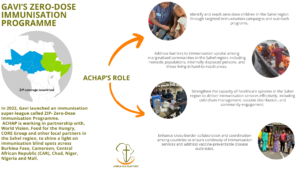World Immunisation Week 2024
This year World Immunisation Week will celebrate 50 years of the Expanded Programme on Immunisation (EPI), a global initiative launched by the World Health Organization in 1974, to ensure equitable access to life-saving vaccines for every child, regardless of their geographic location or socioeconomic status.
At its inception in 1974, the Expanded Programme on Immunisation (EPI) focused on protecting all children against 6 childhood illnesses, but today, this number has grown to 13 universally recommended vaccines across the lifecourse, and 17 additional vaccines with context dependent recommendations.
The creation of Gavi, the Vaccine Alliance, added another dimension to EPI’s success by providing international support to countries to enable the broader introduction of a range of new vaccines. In 2022, Gavi launched an immunisation super-league called ZIP- Zero-Dose Immunisation Programme. About 4 million zero-dose children live across 11 countries clustered in the Sahel and the Horn of Africa, two fragile areas characterized by high levels of poverty, limited access to healthcare services, frequent humanitarian crises, and logistical challenges due to vast and often remote territories. These factors contribute to low immunisation coverage rates, leaving many children vulnerable to vaccine-preventable diseases such as measles, polio, and pneumonia.
In the Sahel, ACHAP is working in consortium with World Vision, Food for the Hungry, CORE Group and other local partners to shine a light on immunisation blind spots across Burkina Faso, Cameroon, Central African Republic (CAR), Chad, Niger, Nigeria and Mali.
Our key roles in this endeavour include:
Conducting Vaccination Campaigns: Implementing periodic vaccination campaigns targeting zero-dose children in collaboration with local health authorities, international organizations, and community leaders. These campaigns utilise mobile vaccination teams to reach children in remote and underserved areas.
Strengthening Healthcare Infrastructure: Advocating for investment in healthcare infrastructure, including the establishment of functional cold chain systems, to ensure the safe storage and distribution of vaccines, and providing training and support to healthcare workers on immunisation protocols and best practices.
Community Engagement and Outreach: Engaging with communities through culturally sensitive communication strategies to address misconceptions and increase awareness about the importance of immunisation, and mobilising community gatekeepers, religious leaders, and local champions to promote vaccination uptake.
Integration with Health Services: Integration of immunisation services with other primary healthcare interventions, such as maternal and child health programs, to maximize coverage and reach underserved populations.
Surveillance and Monitoring: Strengthening disease surveillance systems to detect outbreaks early and respond promptly with targeted immunisation campaigns, monitoring immunisation coverage and vaccine uptake rates to track progress, and identifying areas for improvement.
Through these interventions, we are leveraging our reach and expertise towards:
Increased immunisation coverage among zero-dose children in the Sahel region, leading to a reduction in vaccine-preventable diseases and associated morbidity and mortality.
Improved capacity of healthcare systems in the Sahel region to deliver immunisation services effectively and sustainably.
Enhanced community awareness and acceptance of vaccination as a vital public health intervention.
Strengthened cross-border collaboration and coordination among countries to address common immunisation challenges and respond to disease outbreaks collectively.

